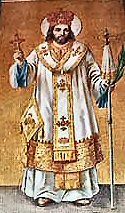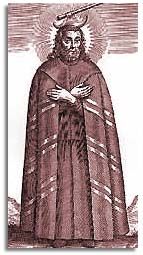Today, November 12, we celebrate the feast day of Saint Josaphat Kuncevyc (1580-1623), bishop of the Eastern Rite, and martyr to Church unity as he died working to bring the Orthodox Church into union with Rome.
Born Joseph Kuncevyc in Vladimir, a city of ancient Poland, today’s future saint was raised in a family of honorable Christians of the Greco-Slavic rite. Under the direction of his mother, he matured in the presence of the Lord, and his heart was drawn to service of his Creator. From early age, he distanced himself from the frivolous pursuits of childhood, avoiding games and play, and instead spending his time in quiet contemplation and prayer. He memorized the Divine Office while still in primary school, reciting large portions of it from memory each day. Joseph also excelled at his studies, earning the respect of peers and teachers for his mastery of the sacred and divine
At that time, the religious situation in Poland was quite divided. Two opposed sects had developed—those who longed for unity and those who perpetuated schism in the Church. Few were faithful to the Holy See. Realizing that Rome was the true protector of orthodoxy and doctrine, Joseph studied theology and philosophy with the Jesuits, and at age 20, entered the Convent of the Trinity at Vilna, a community of Basilian religious submissive to the Holy See. He received his habit and was professed at age 24. To do this, he turned down the offer of inheritance of a successful commercial business, and several opportunities to marry.
Joseph was ordained a priest, and took the name Josaphat, and began preaching about unification with great success. After several years, he was sent to found new houses in Rome. Josaphat immediately put into practice his early plans of reform. Because his plans tended to reflect his own extremely austere ascetic tendencies, he was not always met with joy. One community threatened to throw him into the river until his general compassion and his convincing words won them over to a few changes.
Recognized for his faith and ability to lead his people, Josaphat was elevated to the first bishopric of Vitebsk, and then later Polotsk when he was just 37 years old. There, he found a church in ruins, both physically and spiritually. Josaphat rebuilt the decrepit Church buildings, restoring them to their former glory. With the clergy, who were in great need of reform, he instituted rules of conduct and published a catechism to be used universally. His most compelling argument was himself. He modeled the virtuous life of a Christ, spending his days preaching, instructing others in the faith, visiting the needy of the towns.
Despite his good works, the schism between the unionists and the separists had increased, and had become to grow bloody. Riots were occurring, with the King of Poland declaring Josaphat the legitimate archbishop (as another had been named by the separists). Josaphat’s former diocese of Vitebsk turned against him, incited by rumors spread by the Lithuanian chancellor, and in peace, Josaphat decided to return to that city to calm the bloodshed and violence. Aware of the danger he might encounter, Josaphat calmly said, "If I am counted worthy of martyrdom, then I am not afraid to die."
The separatists saw their chance to get rid of Josaphat and discredit him if they could only stir the unionist party to attack firs, giving them a reason to fight back. Their threats were so public that Josaphat preached on the gospel verse John 16:2, "Indeed, an hour is coming when those who kill you will think that by doing so they are offering worship to God."
In one of his most famous speeches, Josaphat said to the people, "You people want to kill me. You wait in ambush for me in the streets, on the bridges, on the highways, in the marketplace, everywhere. Here I am; I came to you as a shepherd. You know I would be happy to give my life for you. I am ready to die for union of the Church under Saint Peter and his successor the Pope."
But aside from words, Josaphat insisted that the unionists not react in any way that did not show patience and forbearance. When the separatists saw that they were not getting the violent response they had hoped for they decided on a more direct attack. A priest was sent to the house where everyone was staying and shouted insults and threats to everyone he saw, especially Josaphat and the Church of Rome. Josaphat knew of the plot against him and spent his day in prayer. In the evening he had a long conversation with a beggar he had invited in off the streets.
The following morning, the priest returned, and while Josaphat was reciting the Divine Office, the house servants locked the priest in a room until Josaphat’s return. He promptly freed him, the damage had been done. Learning of the priest’s imprisonment, the separatist mob waiting outside descended on the house. Josaphat came out in the courtyard to see the mob beating and trampling his friends and servants. He cried out, "My children what are you doing with my servants? If you have anything against me, here I am, but leave them alone!"
With shouts of "Kill the papist" Josaphat was hit with a stick, then an axe, and finally shot through the head. His bloody body was dragged to the river and thrown in, along with the body of a dog who had tried to protect him.
The servants and friends of Josaphat were rescued from the mob by some Jewish residents of Vitebsk, uninvolved in the Christian fight. With great courage, they rushed into the fray, protecting the innocent and bringing them to safety. Later, these same courageous individuals were the only ones to publicly accuse the killers and mourn the death of Josaphat.
The death of Archbishop Josaphat galvanized those who were unsure of the importance of alignment with the Holy See. Public opinion moved toward unity, and eventually, all were reconciled with Rome. In 1867 Josaphat became the first saint of the Eastern church to be formally canonized by Rome as a Saint.
Saint Josaphat’s body, recovered form the river, was buried in Biala, Poland, and after five years, was found to be completely intact and incorrupt. A silver reliquary was made for it, with a life-sized image of the reclining saint surrounding it. More than one hundred years later, the body was again examined, and found to be intact. The relics were translated to the Basilica of Saint Peter in Rome, where they are venerated today.
Today, we continue to experience schisms and disagreements within the Church, and between the Christian faith traditions. These disagreements only serve to divide the Body of Christ, and prevent unified works of charity and reform in the world. We pray for Saint Josaphat’s intercession, for unification and communion.
Lord,
fill your Church with the Spirit
that gave Saint Josaphat courage
to lay down his life for his people.
By his prayers
may your Spirit make us strong
and willing to offer our lives
for our brothers and sisters.
We ask this through our Lord Jesus Christ, your Son,
who lives and reigns with you and the Holy Spirit,
One God, for ever and ever. Amen.
Year 2: Day 316 of 365
Prayer Intentions: Church unity.
Requested Intentions: Blessings on overseas employment (M); Healing of mother (L); Successful employment for husband (G); Successful employment, personal fulfillment (C); Health and recovery of ill sister (A); Resolution of legal issues; Grace and protection (E); Successful and meaningful employment (S); Restoration of a marriage (A); Peace and tolerance in a family, support for those with Parkinson’s Disease (M); For the restoration of a daughter’s marriage, end to debt (S); Employment and continued strength (K); Successful examinations for a son (J); Employment and blessings of a child (S); Employment and financial security (F); Successful work placement, continued health (A); Grace and healing for a family (P); Healing of a father (M); Academic success for son, employment for husband and brother (B); Freedom from anxiety and panic attacks (R); Health and healing in preparation for surgery (C); Healing of a chronic illness (P); Safety of a family during storms (A); Successful home ownership (P); Healing of a marriage (M); Employment for a husband, blessings for a marriage (E); Successful examinations for a daughter, healing of a relationships (V).
Why pray the Rosary every day for a year?
Each time the Blessed Virgin has appeared-- whether it be to Saint Bernadette Soubirous at Lourdes; to Lucia, Jacinta, and Francisco at Fatima; or to Mariette Beco at Banneux-- she has asserted the importance, saving grace, and power of praying the Holy Rosary on a daily basis. Based upon her words, the Rosary is penance and conversion for sinners, a pathway to peace, an end to war, and a powerful act of faith in Jesus Christ. Pope Paul VI presented the Rosary as a powerful means to reach Christ "not merely with Mary but indeed, insofar as this is possible to us, in the same way as Mary, who is certainly the one who thought about Him more than anyone else has ever done."
To show us how this is done, perhaps no one has been more eloquent than the great Cardinal Newman, who wrote: "The great power of the Rosary consists in the fact that it translates the Creed into Prayer. Of course, the Creed is already in a certain sense a prayer and a great act of homage towards God, but the Rosary brings us to meditate again on the great truth of His life and death, and brings this truth close to our hearts. Even Christians, although they know God, usually fear rather than love Him. The strength of the Rosary lies in the particular manner in which it considers these mysteries, since all our thinking about Christ is intertwined with the thought of His Mother, in the relations between Mother and Son; the Holy Family is presented to us, the home in which God lived His infinite love."
As Mary said at Fatima, "Jesus wants to use you to make Me known and loved. He wishes to establish the devotion to My Immaculate Heart throughout the world. I promise salvation to whoever embraces it; these souls will be dear to God, like flowers put by Me to adorn his throne."

Subscribe to:
Post Comments (Atom)















0 comments:
Post a Comment
Thanks for leaving a comment. If you wish to submit a prayer request, however, please do so above, using the "Contact" tab.